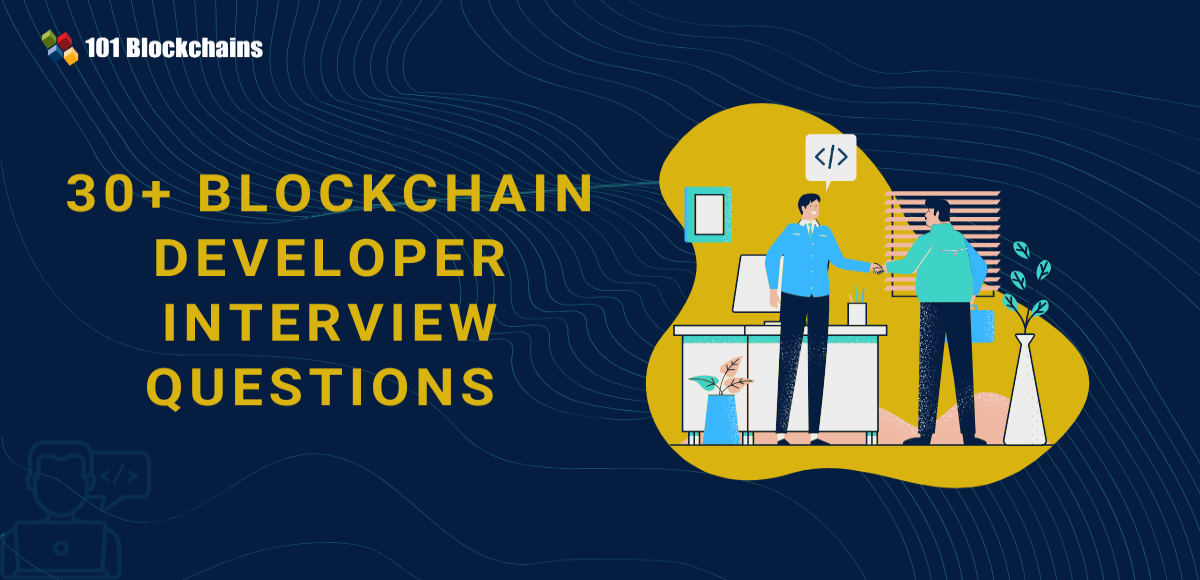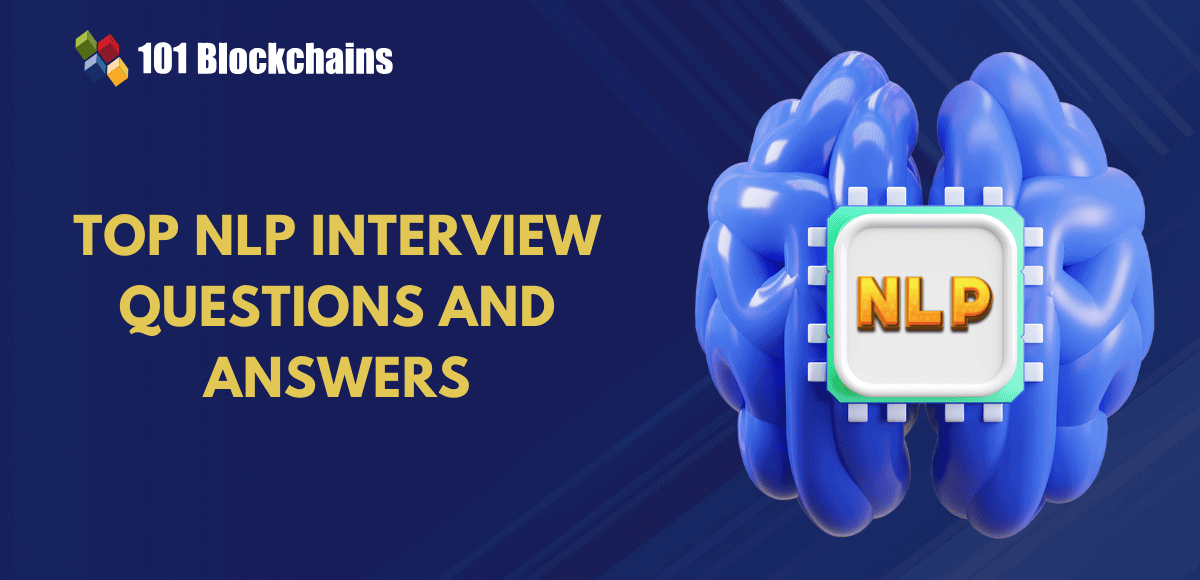Learn how blockchain truly works, master key definitions, and uncover what makes smart contracts so "smart." Dive into the fundamentals, gain valuable insights, and start your blockchain journey today!

- Interview Preparation
Georgia Weston
- on January 01, 2024
Top 20 Prompt Engineering Interview Questions and Answers
The applications of generative AI and Large Language Models or LLMs have become one of the major topics of discussion on the internet. As more people want to learn about tools like ChatGPT and Google Bard, the interest in prompt engineering has also increased by huge margins. Prompt engineering focuses on developing and refining the inputs for obtaining desired responses from LLMs.
You can become a prompt engineer by preparing for top prompt engineering interview questions and developing the essential skills required for prompt engineering. Large Language Models have been developed by training them on massive volumes of training data. However, they could falter in terms of detecting subtle nuances in the queries of users. Therefore, it is important to ask the right questions to evoke the right answers from LLMs.
The demand for prompt engineering has gained momentum in the event of rising popularity of generative AI use cases. Prompt engineers leverage their knowledge of natural language and LLMs for designing prompts with different techniques. However, candidates could have some apprehensions before facing prompt engineering interviews. The average annual salary of prompt engineers could range up to $325,000.
Therefore, you should expect tough, prompt engineering interview questions to prove your prompt engineering expertise to potential employers. With prior knowledge of interview questions for prompt engineers, you can overcome the apprehensions before the interview. Let us find out the top interview questions for prompt engineers.
Top Interview Questions for Prompt Engineers
You might be thinking about the necessity of learning the best prompt engineering interview questions and answers for prompt engineering jobs. The interview questions could help you understand the type of questions you can expect in the interview. On top of it, you can also measure the difficulty of different questions and how to approach them with the best answers. Here are some of the notable interview questions for aspiring prompt engineers.
Basic Interview Questions for Prompt Engineers
The first set of most popular prompt engineering interview questions focuses on the questions about prompt engineering fundamentals. The following questions would help the interviewers check your knowledge of the basic concepts of prompt engineering.
1. What is prompt engineering?
Prompt engineering refers to the process of creating the right prompts that could instruct generative AI tools to generate the right responses. It focuses on creating the right prompts or instructions that can help the AI tool understand the user query. Effective, prompt engineering helps the Large Language Model in providing the most relevant answer to your queries. You can also define prompt engineering as the process of designing and refining prompts to improve the performance of AI models in different tasks, such as text generation, translation, and image generation.
2. What are the responsibilities of a prompt engineer?
The list of entries among responses to “What are the questions for a prompt interview?” would also focus on the responsibilities of the prompt engineer. Prompt engineers serve a crucial role in development and optimization of AI-generated text prompts. In addition, prompt engineers ensure that the prompts offer relevance and accuracy for different use cases. On top of it, prompt engineers must also fine-tune the prompts to ensure the best results. The role of prompt engineers also focuses on improving user experience with AI tools by creating simple and contextually relevant prompts.
Dive into the world of prompt engineering and become a master of generative AI applications with the Prompt Engineer Career Path.
3. What are the important skills required for prompt engineers?
The outline of top prompt engineering interview questions also focuses on the skills required for prompt engineers. Prompt engineers should have problem-solving, analytical, and communication skills. You don’t need a technical background to become a prompt engineer.
Communication skills help in working in collaboration with team members and clients. Analytical skills can help in using data analysis for informed decision-making to facilitate system enhancements. In addition, the problem-solving skills of a prompt engineer help them in addressing problems due to system glitches.
4. What are Generative AI models?
Another important addition to basic prompt engineering interview questions would focus on definition of generative AI models. Generative AI models are AI algorithms with the ability to generate new data based on their training data. With a specific dataset, generative AI models could learn and develop new samples with similar traits as the original data. Generative AI models utilize complex mathematical algorithms alongside deep learning techniques for learning the underlying features and patterns in training data.
5. What are the common tasks you can achieve with generative AI models?
The primary advantage of generative AI models is the ability to understand the patterns in data. In addition, generative AI models have the capability for understanding the complexity and variations in real-world data. Therefore, the generative AI models could work as effective tools in use cases such as text and speech synthesis, image and video generation, composing music, and data augmentation.
6. Do generative AI models have any limitations?
The collection of best prompt engineering interview questions and answers also tests your knowledge of the limitations of generative AI. One of the most prominent challenges of generative AI points to the concerns of bias involved in training the models. Another prominent challenge for generative AI models points to the lack of interpretation of the models. As a result, it is difficult to determine why the generative AI models make certain decisions or make specific predictions.
Identify the full potential of generative AI in business use cases and become an expert in generative AI technologies with the Generative AI Skill Path.
7. What are Large Language Models?
Large Language Models, or LLMs, are an AI model that leverages natural language processing or NLP techniques for generating text or completing tasks on the basis of input data. Some of the common use cases of LLMs include language translation, content creation, and predictive typing. Prompt engineering has emerged as a crucial tool in developing LLMs while ensuring their ethical and responsible usage.
8. What are NLP models?
You can also come across responses to “What are the questions for a prompt interview?” with references to NLP models. Natural Language Processing or NLP models are computer algorithms designed for understanding and processing human language. NLP models utilize machine learning techniques for analyzing text, extracting relevant information, and making predictions or decisions. NLP models can serve a broad range of tasks, including chatbot interactions, language translation, and sentiment analysis.
9. What are the challenges associated with NLP models?
Natural language processing models have been associated with multiple advantages. However, you should also keep an eye on the challenges with NLP models. Some of the most prominent challenges for NLP models include lack of context, bias in training data, and ambiguity in natural language. On top of it, NLP models can struggle to understand slang or informal language.
10. How can you address the challenges with NLP models?
The most popular prompt engineering interview questions also test your knowledge of best practices for resolving challenges with NLP models. It is important to note that NLP models are still in the nascent stages. As the technology grows further, you can expect promising improvements in NLP models for managing the complexities in natural language. In addition, techniques such as algorithmic improvements and data cleaning alongside ethical considerations for developing NLP models can also help in resolving the challenges with NLP models.
Master the concepts of ChatGPT to boost your skills, improve your productivity, and uncover new opportunities with our ChatGPT Fundamental Course.
Advanced Interview Questions for Prompt Engineers
After testing your knowledge of prompt engineering basics, interviewers would ask prompt engineering interview questions to test your expertise in practical uses of prompt engineering. Here are some of the advanced interview questions for aspiring prompt engineers.
11. What is zero-shot prompting?
Zero-shot prompting is a prompting technique that helps in training LLMs to perform tasks without any prior examples. It involves training the model on a broad set of data alongside a comprehensive understanding of the language structures. Zero-shot prompting has proved useful for different tasks such as machine translation, text classification, and sentiment analysis.
12. What is few-shot prompting?
Large language models have gained popularity for offering impressive zero-shot learning capabilities. On the contrary, they present limitations in addressing complex tasks. Therefore, you can come across top prompt engineering interview questions focused on a few-shot prompting. It is a prompting technique that helps machines in answering questions or performing tasks with minimal training data. Few-shot prompting involves the use of niche examples or prompts that enable in-context learning.
Excited to learn more about zero and few-shot prompting, Read here What Are Zero-Shot Prompting and Few-Shot Prompting?
13. What are the best practices for writing prompts?
The best practices for writing prompts revolve around ensuring clarity and conciseness in the prompts. You should maintain clarity regarding the desired task and specify the context for the LLM. In addition, it is also important to use simple language and avoid jargon, alongside providing examples for the desired behavior of the model.
Learn about the fundamentals of Bard AI, its evolution, common tools, and business use cases with our Google Bard AI Course.
14. What is the role of temperature in LLM models?
The best prompt engineering interview questions and answers in the advanced stages would focus on concepts like temperature in LLMs. Temperature is the parameter in LLMs that helps in controlling the randomness of outputs by the model. Higher temperatures could lead to more creative or random outputs, while lower temperature leads to more deterministic responses.
15. How can you address the problems of ambiguity in prompts?
Prompt engineers can choose two different methods for dealing with ambiguity in prompts. The first method involves providing more context to the prompts. If you want the LLM to write a story about love, then you should provide examples of stories about love. In addition, you should also implement some constraints, such as the length of the story. The second method for dealing with ambiguity in prompts involves the use of multiple prompts.
16. What are the best practices for avoiding bias in prompts?
The collection of most popular prompt engineering interview questions also draws attention to the methods for avoiding bias in prompts. You can avoid bias in prompts by refraining from using culturally biased or gender-specific language. Prompt engineers must account for diverse backgrounds when crafting prompts and should review prompts to check for unintentional biases. In addition, prompt engineers can avoid bias by specializing in inclusive language alongside seeking feedback from peers to identify potential biases.
Want to understand the importance of ethics in AI, ethical frameworks, principles, and challenges? Enroll now in the Ethics Of Artificial Intelligence (AI) Course
17. How would you create a prompt for complex technical concepts?
Candidates can also expect prompt engineering interview questions that evaluate their approach to complex use cases in prompt engineering. You can start by breaking down the problem into key components and use analogies to explain the problem. In the next step, you have to develop scenario-based prompts for simulating the problem and obtain feedback from peers. It is also important to ask questions to users before deploying the solution.
18. How can you manage unexpected responses from LLMs?
You can manage unexpected responses from LLMs by iterating on the prompt. First of all, it is important to review the prompt to ensure clarity. In the next step, you have to modify the prompt structure and words according to your requirements. Furthermore, you should also include additional requirements or constraints for guiding the output of the model.
19. Can you use prompt engineering to answer open-ended questions?
Yes, you can use prompt engineering for answering open-ended questions. For example, prompt engineering can instruct LLMs to provide answers to hypothetical situations or offer summaries for factual topics. You can tailor prompt engineering for open-ended questions by maintaining conciseness and clarity in the prompt. In addition, you should also refrain from using technical terms or jargon.
20. Which industry can benefit the most from prompt engineering?
Prompt engineering is a crucial requirement for industries that plan on using generative AI. You can respond to such top prompt engineering interview questions by pointing out the use cases of generative AI. Prompt engineering could serve as a valuable tool for different industries, including finance, entertainment, healthcare, and manufacturing.
Excited to learn the fundamentals of AI applications in business? Enroll now in the AI For Business Course
Conclusion
The review of the most popular prompt engineering interview questions shows that candidates preparing for prompt engineering jobs have a tough challenge. You need comprehensive professional training for prompt engineering to understand the fundamentals and best practices for using prompts.
Prompt engineering could revolutionize the AI landscape by invoking personalized responses from AI models. You can also become a prompt engineer by learning the important interview questions and preparing for the questions with impactful answers. Explore the collection of best learning resources on the internet to learn more about prompt engineering right now.






